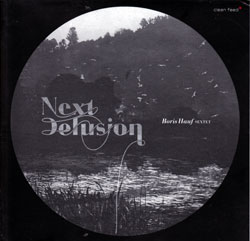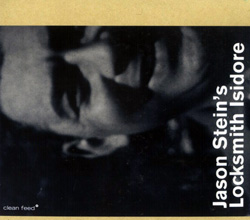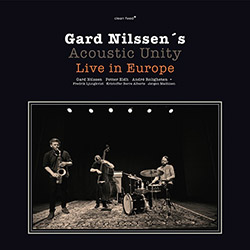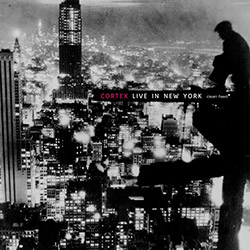![Stein's, Jason Locksmith Isidore: After Caroline [VINYL] (Northern Spy) Stein's, Jason Locksmith Isidore: After Caroline [VINYL] (Northern Spy)](https://www.teuthida.com/productImages/misc4/26070.jpg)
The fourth release from Chicago bass clarinetist Jason Stein's Locksmith Isidore, a trio with Jason Roebke on bass and New York drummer Mike Pride, playing modern creative jazz with a twisted melodic sense through Stein's original compositions, alongside one collective comoposition and John Coltrane's "26-2", a great example of 21st century jazz.
Save $2.00
Out of Stock
Quantity in Basket: None
Log In to use our Wish List
Shipping Weight: 24.00 units
Sample The Album:
Jason Stein-bass clarinet
Jason Roebke-bass
Mike Pride-drums
Click an artist name above to see in-stock items for that artist.
UPC: 754697444295
Label: Northern Spy
Catalog ID: LP-NS-099
Squidco Product Code: 26070
Format: LP
Condition: New
Released: 2018
Country: USA
Packaging: LP
Recorded at Electrical Audio, in Chicago, Illinois, on July 15th and 16th, 2017, by Nick Broste.
"Walden's Thing" is written for Detroit saxist/bandleader Donald Walden, with whom Stein studied at the University of Michigan. Stein wryly explains of the tune: "as a strict bebop linguist, Donald would have hated it, but with a smile, which makes me happy." On another tune, "Eckhardt Park," Stein pays tribute to his west loop woodshed in Chicago during a time when he could be seen serenading the traffic in front of the Dan Ryan Expressway. He'd hop the fence near his home and strengthen his sound, playing his way AND the highway. Pride's mallets are particularly pugnacious on "Walden's Thing" and the abstract tone poem "Ida Like," which was inspired by Stein's late great aunt and his four-year-old daughter who share the same name. Roebke's arco shavings, assorted creaks, strums and pings are a whole other trick bag from his broad willowy swing. The atmospheric concoction conjures Ida, Alice-in-Wonderland-like, picking a lock herself. "Sternum" is further fodder for the textural ingenuity of the trio. Stein lays in back with muted, quizzical longtones, flutter tonguing like a surreptitious rattler, as drum and bass hatch an ominously intriguing soundscape.
Stein alone is a pioneering force, pushing the vocabulary for his chosen horn way beyond the norm. Yet he's heard to finest effect in this trio of quicksilver like-minds who know best how to goad, shape and angle his vision."-Northern Spy
"A lot of ink virtual and actual has contributed to observations around Jason Stein's chosen instrument. Despite its storied history as a jazz implement, the bass clarinet still has an air of novelty and thereby notoriety about it. Stein's opinion on the matter is evident in the degree of passion and engagement he brings to seemingly every musical outing. In his hands it's never a gimmick, but rather a sincere means of creative expression, different, but no less viable than its better-known and more prevalent reed brethren. Stein's approach to album-drafting is comparably free of artifice or over-thinking. After Caroline involves Locksmith Isidore, his working trio with bassist Jason Roebke and drummer Mike Pride investigating six Stein originals, a collectively improvised piece and a limber, effusive rendition of John Coltrane's "26-2", itself a contrafact of Charlie Parker's "Confirmation" with new melody affixed.
Avoidance of frills doesn't mean a reliance on rote as Stein opens the album with a solo extemporization on "As Many Chances as You Need" that runs the register limits of his reed before locking on a stomping groove stamped with finger-popping snare shots and knee-buckling bass stops. "Eckhart Park" alights on slaloming rhythmic obstacle course and finds Pride digging in on the breaks with some forceful press rolls and whirlpools as Stein and Roebke play it contrastingly soft and mellifluous. "Ida Like" trades meter for texture with Roebke rubbing and thrumming against eddying cymbal splashes and an array of grainy reed murmurs. "Walden's Thing is seven-minutes of ardent, churning freebop with all three players elbowing amicably for prominence amidst the galloping vertical momentum. Stein's selection of throaty tone and assemblage of effects is at once diverse and deliberate.
The sauntering ballad "You Taught Me How to Love" tacks to the other end of the stylistic spectrum, trading velocity and density for a laidback confluence of instruments and a through-theme that mixes melancholy with a bit of wry whimsy. Pride stirs his skins with brushes while Roebke drops bulbous tones as counterweight, walking a solo that parses the beat without flouting it. The feel is one of easy conversation free of platitudes or pleasantries. "We Gone" signals the end with another stomp set to a backbeat and strong ostinato. Stein uses both as a springboard for a solo steeped in layered sound that ferries emotion without compromising the undergirding ferocity of the funk. That balancing act is actually a cogent correlation for the trio's applied blend of prowess and quiet profundity, a parallel also found in Stein's unassuming application of an instrument once-considered unconventional."-Derek Taylor, Dusted Magazine
Also available on CD.Artist Biographies
• Show Bio for Jason Stein "Jason Stein was born in 1976 and is originally from Long Island, New York. Stein is one of the few musicians working today to focus entirely on the bass clarinet as a jazz and improvisational instrument. He studied at Bennington College with Charles Gayle and Milford Graves, and at the University of Michigan with Donald Walden and Ed Sarath. In 2005, Stein relocated to Chicago and has since recorded for such labels as Leo, Delmark, Atavistic, 482 Music and Clean Feed. Stein has performed throughout the US and Europe, including performances in festivals in Lisbon, Cracow, Utrecht, Barcelona, Debreccen and Ljubljana. He has had the opportunity to perform with a number of exciting local and international musicians including: Michael Moore, Jeff Parker, Oscar Noriega, Rudi Mahall, Ken Vandermark, Rob Mazurek, Jeb Bishop, Ingebrigt Haker-Flaten, Urs Leimgruber, Pandelis Karayorgis, Fred Lonberg-Holm, Tony Buck, Eric Boren, Kent Kessler, Tobias Delius, Michael Zerang, Michael Vatcher, Peter Brotzman, and Wilbert DeJoode." ^ Hide Bio for Jason Stein • Show Bio for Jason Roebke "Jason Roebke is a double bassist, improviser and composer living in Chicago. He was born and raised in tiny Kaukauna, Wisconsin in 1974 and began playing electric bass at age 14. His first fascination was with Motown bassist James Jamerson. Roebke's first introduction to jazz was at a summer jazz camp run by local legend, pianist, John Harmon. Here he heard recordings of Charlie Parker and a life long fascination with music was begun. His high school band director had a small jazz CD collection which included Ornette Coleman's "The Art of the Improvisers" and Charles Mingus "Mingus Ah Um" which he listed to endlessly for years. Entering college at the University of Minnesota for an extremely short stay, he returned to Wisconsin, graduating from a small liberal arts university in 1996. Roebke moved to Madison, WI to study with legendary saxophonist and composer Roscoe Mitchell. There he worked as Mitchell's music copyist for 18 months, spending nearly everyday at Mitchell's home reworking orchestral and chamber music scores with the composer. In 1998, Roebke entered the University of Michigan where he studied with bassist Rodney Whitaker. In 1999, Roebke moved to Chicago and quickly began working with a new crop of young improvisers. There were early associations with saxophonists Aram Shelton, Dave Rempis and Matt Bauder (also a Michigan alumnus); drummers Tim Daisy and Frank Rosaly and cornetist Josh Berman. Soon after his arrival in Chicago, Roebke organized his first quartet with Bauder, guitarist Jeff Parker, and drummer Chad Taylor. He also began playing with a large improvising ensemble Chicago Improvisers Group with Ken Vandermark, Jeb Bishop, Michael Zerang, Jim Baker among others. He made his first recording as a leader in 2003 with "Rapid Croche" on 482 Music. A trio session with saxophonist Aram Shelton and drummer Tim Daisy, the recording was a critical success. Also during this time, Roebke began his long and continuing association with Fred Lonberg-Holm. Roebke played, toured and recorded with Lonberg-Holm's Terminal 4 and Valentine Trio. Roebke was the instigator of three recordings and a tour with the improvising trio tigersmilk, with cornetist Rob Mazurek and Vancouver drummer Dylan van der Schyff. In recent years, Roebke has been playing with Jason Adasiewicz's Rolldown, Jason Stein Trio, Jeb Bishop Trio, James Falzone's KLANG, Jorrit Dijkstra's Flatlands Collective, Pillow Circles, and The Whammies, Keefe Jackson, and Mike Reed's People, Places, and Things. The trio of Nate Wooley, Fred Lonberg-Holm and Roebke released two recordings "Throw Down Your Hammer and Sing" and an untitled LP. Roebke and Berlin-based tenor saxophonist Tobias Delius released a duo CD on Nottwo Records in 2012." ^ Hide Bio for Jason Roebke • Show Bio for Mike Pride "Mike Pride: Percussionist • Composer • Vocalist • Visual Artist Born and raised in Southern Maine, but based out of New York City since 2000, Mike Pride currently performs solo, leads modern-jazz quartet From Bacteria To Boys, the 7-drummer installation-band Drummer's Corpse, and the MDC piano trio I Hate Work. He also co-leads the ensembles Pulverize The Sound (w/ Peter Evans and Tim Dahl), and Period (w/ Charlie Looker and Chuck Bettis). Pride is renowned for his ability to excel in a wide range of genres and ensembles. He has worked with everyone from improvised music icon Anthony Braxton to punk legends Millions Of Dead Cops, toured extensively on four continents, appeared on more than 100 recordings, and is currently touring the world opening for comedian Amy Schumer with Jason Stein's Locksmith Isidore. A short list of his collaborators includes Mick Barr, Tim Berne, Boredoms, Eugene Chadbourne, Nels Cline, Andrew D'Angelo, Trevor Dunn, Dynamite Club, Peter Evans, Charles Gayle, Milford Graves, Drew Gress, Mary Halvorson, Curtis Hasselbring, Nona Hendryx, Jon Irabagon, Brad Jones, Haino Keiji, Kirk Knuffke, George Lewis, Frank Lowe, Bill McHenry, Tony Malaby, Sam Mickens, Butch Morris, Joe Morris, William Parker, Marc Ribot, Matana Roberts, Herb Robertson, Jamie Saft, Sonny Simmons, Craig Wedren, Nate Wooley, Otomo Yoshihide and John Zorn. Pride's versatility doesn't end with his eclectic résumé as a popular sideman and leader/co-leader of many active ensembles spanning the worlds of modern-jazz, avant-rock, noise and doom metal improv. He is also a busy educator and clinician, a soundtrack composer for TV shows, video games, podcasts, independent films, and websites, and an experienced and exhibited visual artist. Mike proudly uses Yamaha Drums & hardware, Vic Firth striking implements, and Humes & Berg Cases." ^ Hide Bio for Mike Pride
4/17/2024
Have a better biography or biography source? Please Contact Us so that we can update this biography.
4/17/2024
Have a better biography or biography source? Please Contact Us so that we can update this biography.
4/17/2024
Have a better biography or biography source? Please Contact Us so that we can update this biography.
Track Listing:
SIDE A
1. As Many Chances as You Need 4:19
2. Eckhart Park 6:21
3. Ida Like 5:09
4. You Taught Me How to Love 6:05
SIDE B
1. Walden's Thing 7:03
2. 26-2 4:07
3. Sternum 5:25
4. We Gone 4:36
Vinyl Recordings
Improvised Music
Jazz
Free Improvisation
Chicago Jazz & Improvisation
Trio Recordings
Melodic and Lyrical Jazz
Search for other titles on the label:
Northern Spy.


![Stein's, Jason Locksmith Isidore: After Caroline [VINYL] (Northern Spy) Stein's, Jason Locksmith Isidore: After Caroline [VINYL] (Northern Spy)](https://www.teuthida.com/productImages/full/26070.Full.jpg)








